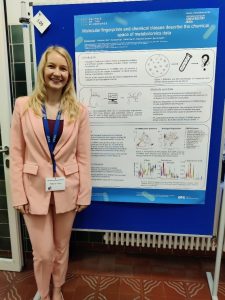Chemical Space & Omics
Contact: Dr. Pilleriin Peets, pilleriin.peets@ut.ee
Ongoing project: Mapping the chemical space of natural biomes by combining non-targeted LC-HRMS datasets (PSG1027). 
The group led by Dr Pilleriin Peets is a still new group in the Chair of Analytical Chemistry, mostly focused on using non-targeted LC-HRMS, molecular fingerprints, predictive models and machine learning to study the chemical space in metabolomics and other natural environments.
Our group’s first project (PSG1027) is investigating the publicly available LC-HRMS datasets to study their chemical space and find ways to compare samples from different sources. We will utilise SIRIUS predicted molecular fingerprints to describe detected unannotated compounds from complex natural samples.
Permanent project members

Pilleriin graduated with her PhD at the University of Tartu in 2020 with research „Development of instrumental methods for the analysis of textile fibres and dyes“. After that, she did two and half years of PostDoc at Stockholm University, developing a machine learning based model „MS2Tox“ to predict acute aquatic toxicity of unknown compounds from non-targeted LC-HRMS datasets. In 2023 she joined a Viral Ecology and Omics group at Friedrich Schiller University Jena, where she worked with predicted molecular fingerprints and their usage in metabolomics.
Dr Karin Kipper completed her PhD at the University of Tartu and continued with an MSCA-funded PostDoc at the St George’s University of London. After finishing her PostDoc, she has worked in various clinical trial bioanalysis and therapeutic drug monitoring roles. She is currently working as a Researcher at the University of Tartu and Laboratory Head at Biolyz FrexCo, where she helps the team measure biomarkers. She is supporting the group with her years of expertise in bioanalytical chemistry, LC-HRMS measurements, targeted and untargeted analysis of small molecules, as well as metabolomics and clinical research.
Tõiv Haljasorg, with years of experience in the practical aspects of measurement, ensures the accuracy and reliability of all measurements.
Collaborators
As part of the Chair of Analytical Chemistry, we collaborate with other groups who have expertise and essential instruments. The Testing Centre of University of Tartu is led by Assoc. Prof. Koit Herodes who has widespread expertise in LCMS studies, derivatization, ionization efficiency measurements, matrix effects in LC-MS and validation. Moreover, the Testing Centre is part of the ECAC/AKKI – an infrastructure network with access to analytical equipment in various organizations.
Additionally, Prof Bas E. Dutilh from Friedrich Schiller University of Jena will provide expertise on the microbiological aspects of metabolomics, while Prof Anneli Kruve group from Stockholm University will assist with computational chemistry.
List of previous publications related to the project:
J. Cheminform. 2025, 17 (82). Chemical characteristics vectors map the chemical space of natural biomes from untargeted mass spectrometry data. (Open Access)
Environ. Sci. Technol. 2024, 58 (39), 17406-17418. Evaluation of Nontargeted Mass Spectral Data Acquisition Strategies for Water Analysis and Toxicity-Based Feature Prioritization by MS2Tox. (Open Access)
Anal. Chem. 2024, 95 (33), 12329-12338. Bypassing the Identification: MS2Quant for Concentration Estimations of Chemicals Detected with Nontarget LC-HRMS from MS2 Data. (Open Access)
Environ. Sci. Technol. 2022, 56 (22), 15508-15517. MS2Tox machine learning tool for predicting the ecotoxicity of unidentified chemicals in water by nontarget LC-HRMS. (Open Access)
